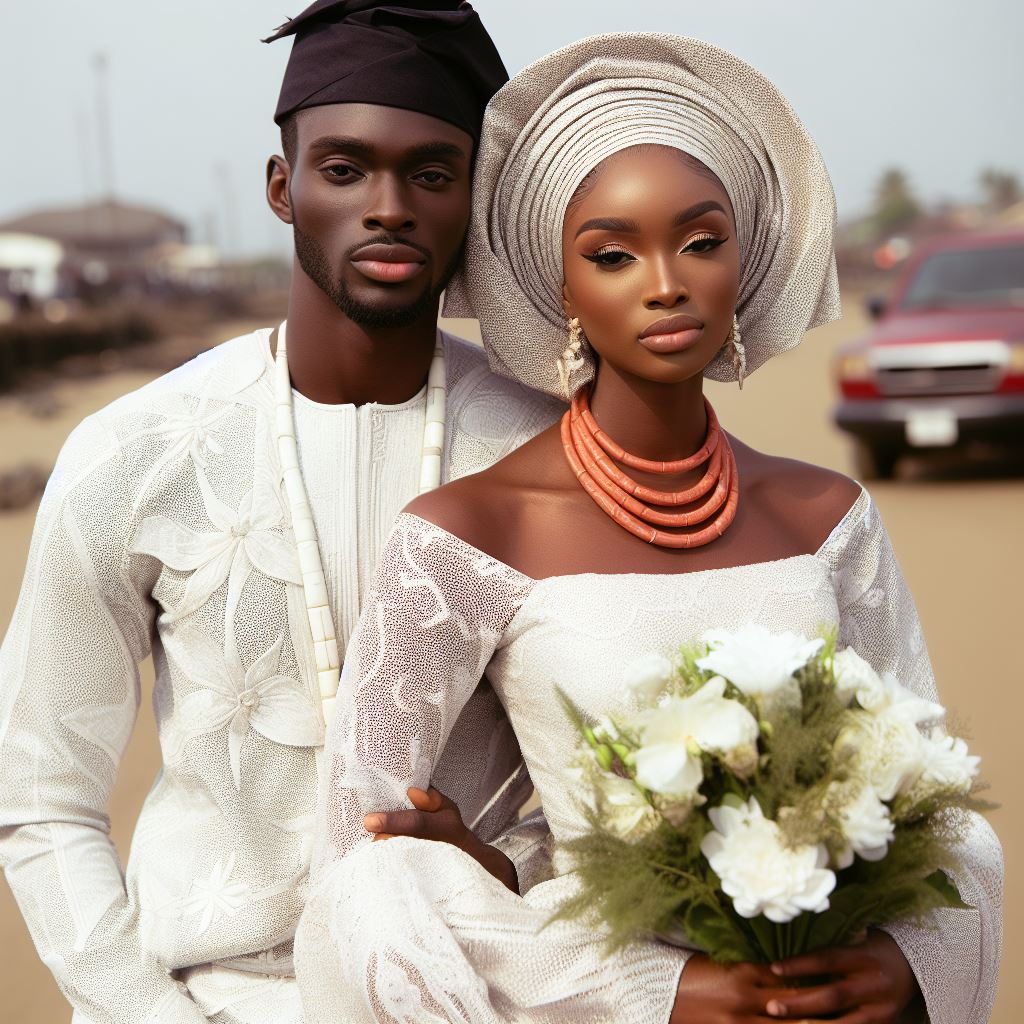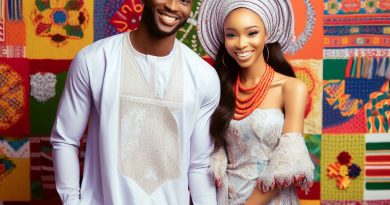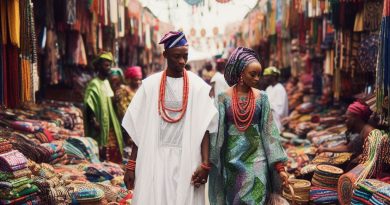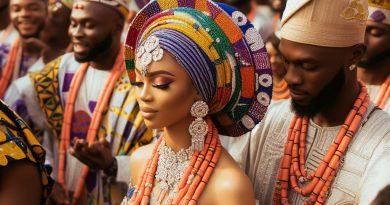Marriage and Religion: The Interplay in Nigerian Society
Last Updated on October 20, 2023
Introduction
Let’s explore marriage and religion: The interplay in Nigerian society.
A. Brief introduction of the topic: Marriage in Nigeria
Marriage in Nigeria is a crucial and deeply-rooted institution in the country’s culture.
B. The significance of religion in Nigerian society
Religion holds significant importance in Nigerian society, influencing various aspects of life.
Nigeria, a country known for its remarkable cultural and religious diversity, is home to a multitude of ethnic groups and religious affiliations.
C. Thesis statement: The interplay between marriage and religion in Nigeria
The nation’s unique blend of traditions and belief systems has fostered a rich tapestry of customs and practices related to marriage.
In this dynamic setting, the relationship between marriage and religion becomes a captivating and complex subject of study.
This section explores the dynamic interplay between marriage and religion in Nigeria, examining their impact on society.
This exploration delves into the intricate connections between marriage and religion in Nigerian society.
It seeks to unveil the profound influence of religious beliefs and practices on the various stages of marital life, from courtship and betrothal to wedding ceremonies and the daily lived experiences of married couples.
This journey into the interplay of marriage and religion in Nigeria will shed light on how these two fundamental aspects of human existence intertwine, impacting the lives of individuals, families, and communities.
We will navigate through the cultural nuances, theological perspectives, and sociological dimensions that give rise to this complex relationship, ultimately uncovering the profound ways in which marriage and religion interact in the vibrant mosaic of Nigerian society.
The Role of Religion in Nigerian Society
A. Dominant Religions in Nigeria: Christianity and Islam
1. Christianity
- Christianity is the most widely practiced religion in Nigeria.
- It was introduced during the colonial era and has since grown significantly.
- Different Christian denominations exist, including Catholicism, Protestantism, and Pentecostalism.
- Churches play a central role in the lives of Nigerians and often serve as community centers.
2. Islam
- Islam is the second largest religion in Nigeria.
- It was introduced through trade and missionary activities in the 11th century.
- Nigerians who practice Islam are predominantly Sunni, but there is also a significant presence of Shia Muslims.
- Mosques are important religious and social gathering places for Nigerian Muslims.
B. Influence of Religion on Various Aspects of Nigerian’s Lives
1. Social Cohesion
- Religion provides a platform for social interaction and community building.
- Churches and mosques serve as meeting points where Nigerians develop close relationships.
- Religious gatherings and festivals foster unity and solidarity among Nigerian society.
2. Morality and Ethics
- Religious teachings guide Nigerian’s moral compass and shape their ethical values.
- Christianity and Islam both emphasize virtues such as honesty, generosity, and compassion.
- Religious codes of conduct influence decision-making on personal and societal levels.
3. Education
- Religious institutions, particularly Christian missionary schools, have played a significant role in Nigeria’s educational system.
- Many Nigerians receive their education in schools operated by religious organizations.
- Religious education is often included in the curriculum, teaching values and principles.
4. Politics
- Religion has a strong influence on Nigerian politics.
- Politicians often seek endorsement from religious leaders and use religion as a campaign tool.
- Religious affiliations can determine voting patterns and political alliances in Nigeria.
C. Significance of Religious Beliefs and Practices in Marriage
1. Pre-marital Preparation
Religious teachings guide individuals on the importance of marriage as a sacred institution.
Engagement in pre-marital counseling and guidance is common in both Christian and Islamic traditions.
Couples are taught about the roles and responsibilities of spouses based on religious principles.
2. Wedding Ceremonies
- Religious customs and rituals form an integral part of Nigerian wedding ceremonies.
- Christian weddings often take place in churches and are officiated by religious leaders.
- Islamic weddings involve the signing of a marriage contract in the presence of witnesses.
3. Family Life
- Religion provides a framework for family values and norms in Nigerian society.
- Christian and Islamic teachings emphasize the importance of love, respect, and mutual support within the family.
- Religious practices, such as daily prayers and reading sacred texts, promote spiritual growth within the family unit.
4. Divorce and Remarriage
- Religious beliefs influence attitudes towards divorce and remarriage in Nigerian society.
- Christianity and Islam have specific guidelines on divorce, which may affect individuals’ decisions.
- Religious leaders often provide guidance and support to couples going through marital challenges.
In fact, religion plays a significant role in Nigerian society.
Christianity and Islam are the dominant religions, shaping various aspects of Nigerians’ lives.
They provide social cohesion, moral guidance, and influence education and politics.
In marriage, religious beliefs and practices are highly significant, guiding individuals in preparing for marriage, conducting wedding ceremonies, and establishing family values.
Religion is deeply intertwined with the fabric of Nigerian society, impacting the beliefs, behaviors, and relationships of its people.
Read: The Role of Extended Family in Nigerian Marital Life
Religious Views on Marriage in Nigeria
In Nigerian society, religion plays a significant role in shaping the views and practices surrounding marriage.
Both the Christian and Islamic perspectives provide guidance and principles that influence the way marriages are conducted and perceived.
A. The Christian perspective on marriage
Among Christians in Nigeria, marriage is viewed as a holy union ordained by God.
Biblical teachings on marriage, such as those found in the book of Genesis and the New Testament, are highly regarded.
These teachings highlight the importance of monogamy, faithfulness, and mutual submission between spouses.
In Nigerian Christian marriages, church ceremonies and customs hold great significance.
Couples often receive blessings from clergy members, exchange vows in the presence of God and their congregation, and participate in symbolic rituals.
The wedding rings symbolize the eternal bond between husband and wife, while the pronouncement of their union as “one flesh” signifies their spiritual unity.
B. The Islamic perspective on marriage
Islamic teachings on marriage in Nigeria are primarily based on the Quran.
The Quran describes marriage as a sacred contract between a man and a woman, founded on love, mercy, and mutual respect.
Muslim marriages are often arranged with the consent of both parties and their families.
The husband is expected to fulfill his responsibilities as a provider and protector, while the wife is encouraged to be obedient and respectful.
Polygamy is permitted in Islam, but it is not a requirement for Muslims in Nigeria.
Islamic marriage rituals and traditions are an integral part of Nigerian Muslim weddings.
The ceremonies often begin with prayers and the recitation of Quranic verses.
The couple exchanges vows and signs a marriage contract known as a “Nikah.”
Family and community members come together to celebrate the union with feasts and festivities.
In short, the interplay between marriage and religion in Nigerian society is deeply rooted in both Christian and Islamic perspectives.
While Christians emphasize the importance of monogamy, love, and mutual submission, Muslims uphold the values of companionship, respect, and obedience.
These religious views shape the beliefs and practices of Nigerians when it comes to marriage, creating a diverse and culturally rich tapestry of traditions.
Read: Building Strong Marriages: Tips from Nigerian Couples

Interfaith Marriages in Nigeria
A. Challenges Faced by Couples from Different Religious Backgrounds
- Conflicting beliefs and practices can lead to disagreements and conflicts within the relationship.
- Family and societal pressure can create tension and discrimination against interfaith couples.
- Different religious rituals and ceremonies may pose challenges when planning the wedding and raising children.
- Interfaith couples often struggle to find common ground and bridge the gap between their religious beliefs.
- Maintaining harmony between the couple’s families and communities can be a difficult task.
B. Social and Cultural Implications of Interfaith Marriages in Nigerian Society
- Interfaith marriages challenge traditional norms and expectations in Nigerian society.
- It promotes religious tolerance and encourages dialogue and understanding between different faiths.
- Interfaith marriages can contribute to the dissolution of religious prejudices and stereotypes.
- It fosters a sense of unity and inclusivity in a diverse society like Nigeria.
- Interfaith marriages often require compromises and adaptations, leading to cultural fusion.
C. Examples of Successful Interfaith Marriages and Lessons Learned
- The marriage between Ahmed, a Muslim, and Adeola, a Christian, highlights the power of love and understanding.
- They have found common ground through mutual respect for each other’s faith and open communication.
- Adeola’s parents initially had reservations but eventually embraced their daughter’s marriage.
- The couple educates their children about their religious backgrounds, promoting tolerance and diversity.
- Their success inspires other interfaith couples to overcome challenges through love and respect.
Religious Practices in Nigerian Weddings
A. Incorporation of Religious Rituals in Nigerian Wedding Ceremonies
Nigerian wedding ceremonies involve the incorporation of various religious rituals.
These rituals differ depending on the religious beliefs of the couple getting married.
A priest or pastor officiates Christian weddings, typically held in a church as the ceremony’s central location.
The couple exchanges vows and rings, with prayers and Bible readings incorporated into the ceremony.
In Muslim weddings, an Islamic cleric performs the ceremony according to Islamic principles.
The couple may recite verses from the Quran, undergo the signing of the marriage contract, and perform prayers.
Traditional Nigerian religions also have their own rituals, which may include offerings and ancestral homage.
These religious rituals give Nigerian weddings a unique cultural and spiritual significance.
B. Significance of Traditional Marriage Ceremonies and Customs
Traditional marriage ceremonies in Nigeria hold great significance in preserving cultural heritage.
Different ethnic groups deeply root these ceremonies in their customs, traditions, and values.
They serve as a way to honor ancestors, strengthen family ties, and pass on cultural knowledge.
The Igbo tribe, for example, has the “Igba Nkwu” ceremony, where the groom’s family presents gifts to the bride’s family.
The Yoruba tribe has the “Eru Iyawo” ceremony, a couple’s introduction to their extended families.
These ceremonies often include colorful attire, dances, music, and traditional foods.
Traditional marriage ceremonies not only unite the couple but also foster unity among communities.
C. Role of Religious Leaders and Clergy During Weddings
Religious leaders and clergy play a vital role in Nigerian wedding ceremonies.
- They act as guides and facilitators of the religious rituals and customs involved.
- In Christian weddings, priests and pastors offer spiritual guidance and blessings to the couple.
- They may also provide pre-marital counseling to ensure a strong foundation for the marriage.
- Islamic clerics lead the couple in reciting traditional prayers and ensure the marriage adheres to Islamic principles.
- Traditional religious leaders, such as chiefs or elders, may oversee ceremonies that incorporate ancestral customs.
- These religious leaders bring a sense of authority, wisdom, and spirituality to the wedding proceedings.
In essence, religious practices play a significant role in Nigerian weddings.
These practices are not only based on religious beliefs but are also intertwined with cultural traditions.
Nigerian weddings beautifully blend religious rituals, such as prayers and readings, with ethnic customs, including colorful attire and dances.
Religious leaders and clergy provide guidance and blessings, adding a sacred dimension to the ceremonies.
Traditional marriage rituals not only celebrate the union of the couple but also preserve cultural heritage and foster unity within communities.
Read: Navigating Marital Roles and Responsibilities in Nigeria
The Influence of Religion on Marriage Laws in Nigeria
A. The legal framework for marriage in Nigeria
In Nigeria, marriage laws are based on both religious principles and legal regulations.
The legal framework recognizes two main types of marriages: customary and statutory marriages.
Customary marriages are governed by traditional customs and practices specific to each ethnic group.
The Marriage Act governs statutory marriages, mandating registration with the government as a necessary step in the process.
B. The interplay between religious principles and legal regulations on marriage
Religion plays a significant role in the formation and dissolution of marriages in Nigeria.
Nigerian society comprises various religious groups, including Christians, Muslims, and traditional African religions.
Each religious group has its own beliefs and teachings regarding marriage, which influence marital practices.
For Christians, marriage is viewed as a sacred union between one man and one woman.
Christian marriage ceremonies often involve religious rites, such as exchanging vows in a church.
Similarly, Muslims adhere to Islamic principles, including polygamy and the importance of dowry.
Islamic marriages are officiated by imams and follow religious rituals and laws.
C. Controversies or conflicts arising from the alignment of religious and legal views on marriage
The alignment of religious and legal views on marriage in Nigeria has resulted in controversies and conflicts.
One major controversy is the recognition of customary marriages as valid under Nigerian law.
Critics argue that customary marriages discriminate against women, as they often lack legal protections.
Polygamy, allowed by Islamic law but limited in statutory marriages, sparks conflicts due to differing legal and cultural perspectives.
This misalignment has led to disputes and legal battles between individuals practicing polygamy and the legal system.
Additionally, LGBTQ+ individuals face challenges in gaining legal recognition for their relationships due to religious and cultural norms.
Nigeria does not recognize same-sex marriages, and LGBTQ+ individuals may encounter social stigma and legal consequences.
In review, religion significantly influences marriage laws in Nigeria, shaping the legal framework and practices.
The interplay between religious principles and legal regulations often leads to controversies and conflicts, especially concerning customary marriages, polygamy, and LGBTQ+ rights.
Finding a balance between religious beliefs and ensuring equal rights for all individuals remains a complex and ongoing challenge in Nigerian society.
Read: Marriage in Nigeria: Balancing Modern Views with Tradition
Conclusion
In this blog post, we have discussed the interplay between marriage and religion in Nigerian society.
It is evident that religion plays a crucial role in shaping marriage practices in Nigeria.
Looking to the future, the dynamic relationship between marriage and religion in Nigeria will continue to evolve, posing new social and cultural challenges.


